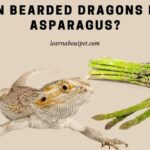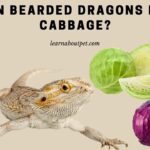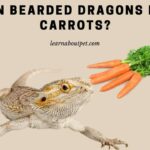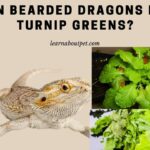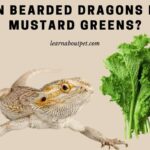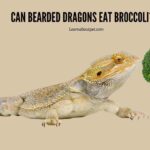Often, owners of bearded dragons express interest in knowing whether they can feed them on superworms. In this article, we explore that question: with a view to know whether the bearded dragons can eat superworms – and if yes, what is the best way to feed them on superworms.
Can bearded dragons eat superworms? The answer is yes. But due to their high fat and chitin content, the superworms should only be a treat, not a staple food. And you shouldn’t desist from feeding baby bearded dragons on superworms.
The reason why you shouldn’t feed baby dragons on superworms is in the fact that, firstly, the superworms are a choking hazard. Moreover, they can cause digestive problems. And they may bite the baby dragons.
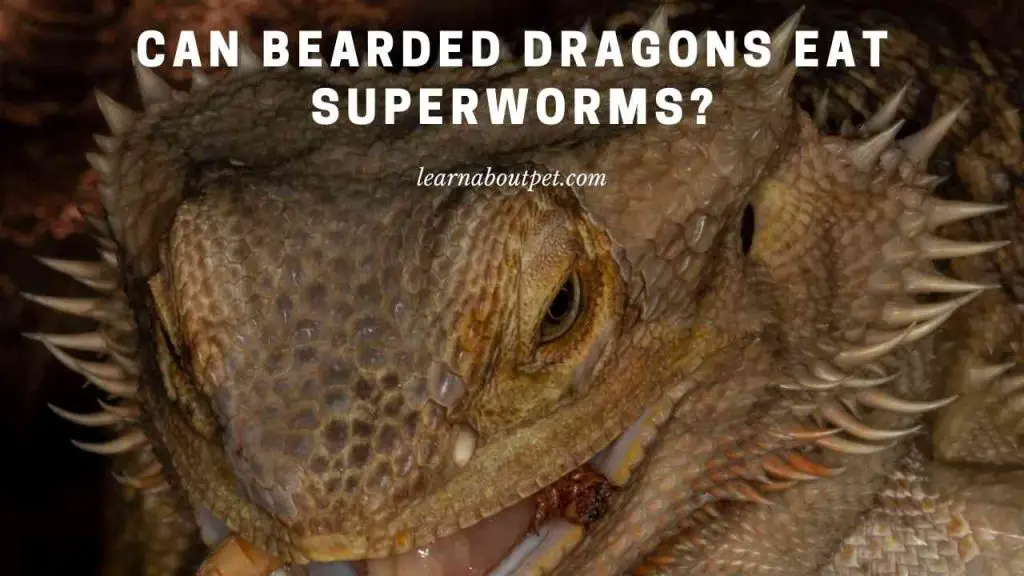
On the other hand, the reason why you should only feed adult dragons on superworms only once in a while is because the superworms have too much fat and chitin. That can cause digestive problems, impaction or obesity.
When it is time to feed your dragon on superworms, what you need to do is grab the superworm with tweezers/tongs. Then place it in front of the lizard – after which the lizard will proceed to devour it.
You can purchase the superworms with which to feed your bearded dragon from pet food vendors. Or you can raise your own superworms, on which to be feeding your lizard.
What Are Superworms?
Before proceeding to answer the can bearded dragons eat superworms question, we first need to understand what the superworms in question are.
As a matter of fact, superworms are not ‘worms’ in the strictest sense of the word. Rather, they are the larvae of a darkling beetle whose scientific name is Zophabas morio.
This therefore means that if you keep them for long enough, they eventually turn into beetles.
For instance, if you purchase superworms for bearded dragons, then fail to feed them to the lizards and continue keeping them, they eventually turn into beetles.
All in all, the superworms are the larvae of darkling beetles.
Having thus understood what the superworms are, we may now proceed to answer the can bearded dragons eat superworms question.
Can Bearded Dragons Eat Superworms?
The simple answer to the can bearded dragons eat superworms question is ‘yes’.
If you place the superworms before the lizard, it will proceed to devour them.
The dragon has the ability to eat superworms. And many people who own these lizards regularly feed them on superworms.
Therefore in terms of whether or not the dragons have the ability to eat superworms, the answer is a categorical ‘yes’.
But the more fundamental questions are, firstly, whether the superworms are safe for the dragons. And secondly, whether the superworms are good/beneficial for the bearded dragons.
It is those two other questions that we now set out to explore.
Are Superworms Safe For Bearded Dragons?
One way of answering the can bearded dragons eat superworms question is by finding out whether the superworms are safe for the dragons.
The answer is that the superworms are, for the most part, safe for these lizards. The only scenario where there may be concern is if you are dealing with a baby beardie.
If yours is a baby dragon, then you shouldn’t feed it on superworms. This is because, firstly, there is a risk of choking. Secondly, the superworms may cause digestive problems in baby dragons – including life-threatening impaction.
And thirdly, the superworms may bite the baby lizards.
But for adult dragons, these risks are really not there. An adult bearded dragon is unlikely to choke on superworms. And whereas the risk of digestive problems (including impaction) remains, it is minimal.
Further, an adult dragon may be too big a deal for a superworm to bite.
Still, it is worth noting that the superworms have a great deal of fat in them. Therefore if you feed your dragon on them too frequently, you may end up with obesity problems.
The too much fat (and chitin) in the superworms may also cause digestive problems, including constipation, in your dragon.
And if you feed your dragon on superworms too much, it may start rejecting other foods in favor of them.
It is on account of these facts that it is advisable to only feed your dragon on superworms once in a while: as a treat.
All in all, superworms are safe for bearded dragons. That is as long as the beardies in question are not baby beardies. And as long as you give the superworms with great moderation, as once-in-a-while treats.
Are Superworms Good For Bearded Dragons?
The other key thing we need to understand, in answering the can bearded dragons eat superworms question, is whether the superworms are good for the lizards.
So far, we have established that the superworms are safe for the dragons. That is as long as they are not baby bearded dragons. And as long as you only give them in moderation, as treats rather than staples.
But are the superworms any good? The answer is yes. The superworms contain quite a bit of protein. They also have a great deal of fat and some fiber. Those are nutrients the lizards need.
The superworms are also apparently very tasty to these lizards. This is what makes them suitable for use as treats.
Their tasty nature also makes them suitable for use as enticements. For instance, if your beardie is reluctant to eat its vegetables, you can put a superworm in them.
The lizard is now likely to end up eating the vegetables, because of the superworm in them.
All these facts may attract comparisons with, say, mealworms. So we end up with superworms vs mealworms bearded dragon comparisons.
One may ask, for instance: are Superworms or mealworms better for bearded dragons?
And the answer is that both superworms and mealworms have their pros and cons as dragon foods.
There are situations where the mealworms are better. And there are situations where the superworms are better.
All in all, inasmuch as the superworms are rich in nutrients that bearded dragons need, they are good for them.

How Often Can Bearded Dragons Eat Superworms?
Ideally, these lizards should only eat superworms once in a while, as treats.
To be more specific, dragons should only eat superworms once or twice per week. Anything beyond once or twice per week may amount to excessively feeding the beardie on superworms.
This leads to another question: on how many superworms to feed a bearded dragon per day.
So, indeed, how many Superworms should a bearded dragon eat a day?
The answer is that you need to restrict yourself to giving a dragon one (or maximum two) superworms per day if it is an adult. But if it is a juvenile, you may give up to 3 – but spread over different meal times.
For baby dragons, the superworms are of course out of question.
Someone may ask, can bearded dragons eat superworms everyday?
Indeed, can bearded dragons eat superworms daily? The answer is no. If you feed dragons on superworms daily, you may end up making them overweight.
You may also end up causing the dragons all manner of digestive problems – including constipation which may complicate into impaction.
Therefore the best thing is to feed the lizards on superworms only once or twice per week. View the superworms as a treat, not as a staple.
What Age Can Bearded Dragons Eat Superworms?
Earlier, while answering the can bearded dragons eat superworms question, we saw that baby bearded dragons shouldn’t be fed on superworms.
This leads to the question, what age can bearded dragons eat superworms?
Already, we know that the answer to the can baby bearded dragons eat superworms question is a categorical ‘no’.
Even if someone were to ask, can baby bearded dragons eat small superworms, the answer would still be ‘no’.
That then leads to the question: can young bearded dragons eat superworms? And the answer is that young dragons (juvenile dragons) – those that are in between the baby stage and adult stage may eat superworms.
Therefore from 5 months of age, beardies can start eating superworms.
How Many Superworms Should A Bearded Dragon Eat A Day?
This question, on how many superworms a bearded dragon can eat a day is a common one. It typically comes up alongside the can bearded dragons eat superworms question.
The answer to it is like this: these lizards should only eat 1 or 2 superworms a day.
And that should be only once or twice per week.
At this point, one may ask, can bearded dragons eat superworms instead of crickets? The answer is that, ideally, superworms shouldn’t take the place of crickets in a bearded dragon’s diet.
That is because whereas crickets can work well as a staple, superworms are only ideal for use as treats.
This may lead someone else to ask, can bearded dragons just eat superworms? Or, in other words, can bearded dragons only eat superworms?
And the answer is that it is not advisable to feed a bearded dragon on superworms alone.
You should view the superworm as simply a treat – not something to feed the dragon on exclusively for any period of time.
Where Can I Get Superworms?
There are two ways in which you can get superworms with which to feed your bearded dragon.
The first approach is where you can buy them from pet food stores.
And the second approach is where you can raise your own superworms, with which to be feeding your dragon.
By the way, can bearded dragons eat dead superworms? The answer is that the dragons usually mostly prefer superworms that are alive. They may nonetheless eat dead superworms in some cases – especially if they are not the picky type.
How To Feed Bearded Dragons Superworms?
You first need to get hold of the superworm – ideally using a pair of tweezers/tongs. Avoid handling the superworms with your hands, as they tend to bite. If you must handle them by hand, wear gloves first.
So, after getting hold of the superworm, you need to place it in front of the dragon. Ideally, it should be at an angle that the superworm can see.
If it is an alive superworm, the beardie will ‘hunt’ it down, and proceed to devour it.
Where it is a dead superworm, the beardie may or may not eat it.
Ensure that you present the superworms in a part of the enclosure that is open. Not one with lots of substrate.
If you present them in a part with substrate, they may disappear into the substrate, then come to disturb the beardie later.
Where it is a dead superworm, the beardie may or may not eat it.
You are more likely to get the lizard to eat the superworms if you present them alive.
Just ensure that you don’t give the dragon too many superworms or too frequently.
One or two superworms per day should be enough. And once or twice per week should also be enough.
Final Verdict – Can Bearded Dragons Eat Superworms
Bearded dragons have the ability to eat superworms. The superworms are, for the most part, safe for them to eat. And the superworms are nutritionally beneficial for the dragons. You only need to ensure that you feed the lizard on the superworms sparingly. One or two superworms per day should be adequate. And the bearded dragon should only eat the superworms once or twice per day.

Feeding the lizard on too many superworms or too frequently on superworms may make it to be overweight. It may also cause digestive problems, including constipation and impaction.
You need to desist from feeding a baby bearded dragon on superworms. The superworms are a choking hazard for the baby beardie, may cause digestive problems or may end up biting the baby bearded dragon.
As a pet lover, make sure to learn about pet more and give your pet bearded dragon a good and comfortable life!

Welcome to Learn About Pet. My name is Rajkumar Ravichandran and I love all pets, travel, and amazing food. I write about my passion and personal experience caring for multiple pets in this blog! ❤️
Post Disclaimer
DISCLAIMER: THIS BLOG OR WEBSITE, "Learn About Pet", DOES NOT PROVIDE YOU WITH MEDICAL ADVICE AND IS NOT A SUBSTITUTE FOR MEDICAL ADVICE. ALWAYS GET IN TOUCH WITH YOUR PERSONAL VETERINARIAN AND USE INFORMATION HERE AS GENERAL ADVICE.
The information, including but not limited to, text, graphics, images and other material contained on this website are for informational purposes only. No material on this site is intended to be a substitute for professional veterinary advice, food recommendation, diagnosis, or treatment. Always seek the advice of your veterinarian or other qualified health care provider with any questions you may have regarding a medical condition or for pet food related questions.
